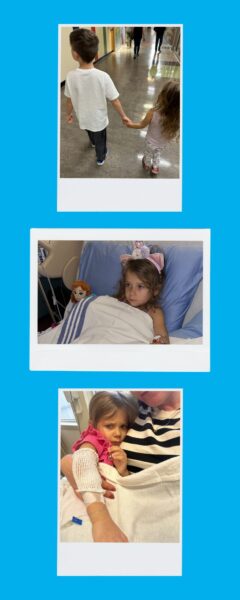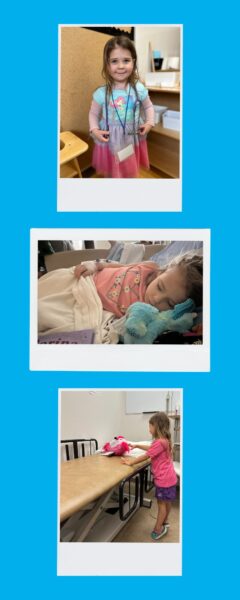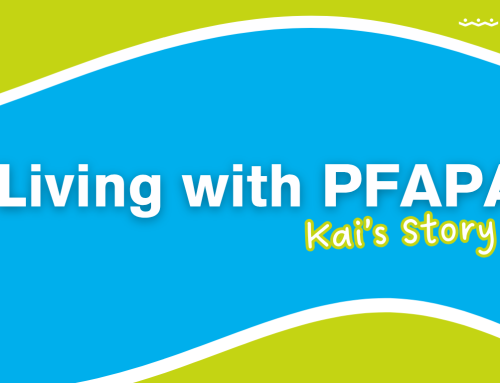Raising Awareness, Sharing Hope:
One Family’s Journey with SJIA



We’re so excited to introduce Tamara Schnarr, one of our new parent ambassadors for the Kitchener-Waterloo region! Tamara, a Realtor with a background in marketing, graphic design, and event management, is passionate about giving back to her community and is looking forward to supporting Cassie + Friends’ mission – a cause very close to her heart. In October 2023, Tamara’s daughter, Brooklyn, was diagnosed with Systemic Juvenile Arthritis (SJIA). Below, Tamara shares more about her daughter Brooklyn’s journey with SJIA, which we are so grateful to share with you today. Tamara lives in Waterloo with her husband, Chris, and their two children; Logan and Brooklyn. As a family, they enjoy summer cottage visits, family movie nights, and attending local events.
Brooklyn’s SJIA Story
Over the last year, our daughter Brooklyn has faced what no child should ever have to endure. She has taken over 70 doses of prednisone, received more than 55 needles through injections, IVs, and bloodwork, endured over 45 consecutive days of high fevers, missed nearly 3 months of her first year of kindergarten, and had her entire young life turned upside down. And hers is considered a mild case.
Thousands of children have had their childhoods disrupted by Juvenile Arthritis, a group of diseases for which there are no known cures. We are incredibly grateful that Brooklyn has responded well to treatment and is now considered to be in medicated remission. Unfortunately, this is not the case for so many others who face relentless pain and uncertainty every day.
In October 2023, our 4-year-old daughter, Brooklyn, was diagnosed with Systemic Juvenile Idiopathic Arthritis (SJIA). What started as a fever quickly escalated into a whirlwind of doctor visits, hospital stays, and uncertainty.
It began like any other illness—restless sleep, fever, and fatigue. By day seven, her wrist was swollen and sore, though she’d been home resting all week. A rash appeared soon after, which we initially chalked up to a viral illness. However, after 10 days of persistent high fevers (104°F), weakness, and swelling, we landed in the ER at Grand River Hospital. Bloodwork revealed extremely high inflammatory markers, and concerns about Juvenile Arthritis were raised for the first time. That evening, we were sent to McMaster for more testing.
Over the next five days at McMaster, Brooklyn underwent countless tests (bloodwork, ultrasounds, X-rays, ECGs) to rule out viral illnesses, Kawasaki disease, and other conditions. All the while, she grew sicker. Her fevers persisted, her rash came and went, and she refused to eat or move. Finally, we received the diagnosis: Systemic Juvenile Idiopathic Arthritis (SJIA). It was terrifying, but we also felt relief to have an answer and a plan.
The first course of treatment was an anti-inflammatory medication, which gave us a glimmer of hope when it temporarily lowered her fever. But her symptoms quickly returned, and our team decided to move to prednisone, a steroid often used as the next step. Small doses turned into larger ones as we desperately tried to see improvement. Instead, Brooklyn seemed to get worse. Her fevers, pain, and fatigue persisted, and the side effects of the steroids began to take hold—emotional distress, sensory overload, extreme water retention, and heartbreaking rages.
After weeks of no progress, the next step was clear but complicated. We needed a biologic medication, tocilizumab (Actemra), to target her SJIA. However, we first had to prove that steroids weren’t working in order to access coverage for the new drug. This process was frustrating and exhausting, but ultimately, it was worth it.
The first injection of Actemra was nothing short of life-changing. Within days, Brooklyn’s bloodwork improved, her fevers subsided, and we finally started to see glimpses of our little girl again. While the injections worked, we still had to face the difficult process of weaning her off prednisone, which took us from November to February. Those months were a battle. The side effects lingered, and Brooklyn struggled emotionally and physically.
Today, thanks to Actemra, Brooklyn’s bloodwork is perfect. She is symptom-free and thriving. While the injections will continue bi-weekly for at least a year, we are incredibly hopeful about her future. SJIA outcomes vary—some children experience a one-time flare and enter remission, while others face ongoing challenges. We are taking it one day at a time and focusing on the gratitude we feel for where we are now.
For the first few months, I barely spoke about what we were going through. It was overwhelming, all-consuming, and deeply personal. Sharing it made it feel more real. But as we’ve moved forward, I’ve realized how important it is to talk about SJIA, connect with other families, raise awareness, and provide hope.
Rheumatic diseases like SJIA impact 3 in 1,000 children in Canada. They are little-known but devastating diseases, and too many families face this battle feeling alone. By sharing Brooklyn’s story, we hope to change that.
Tamara








Leave A Comment